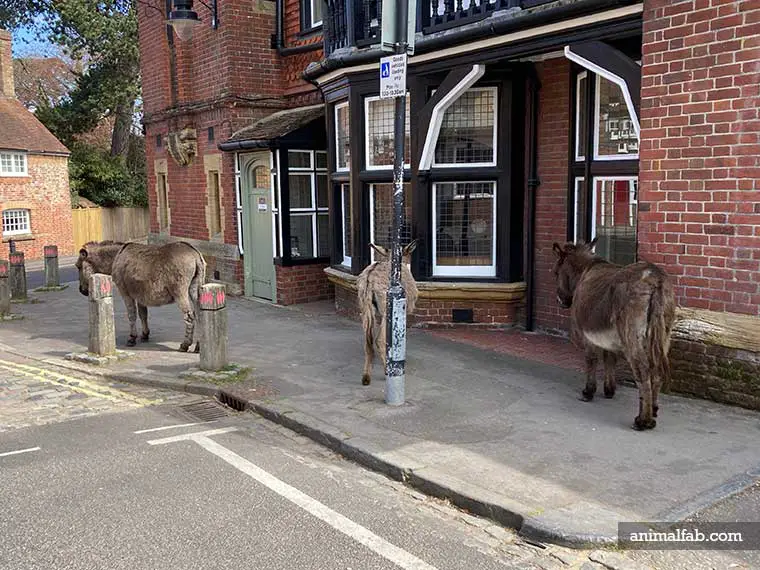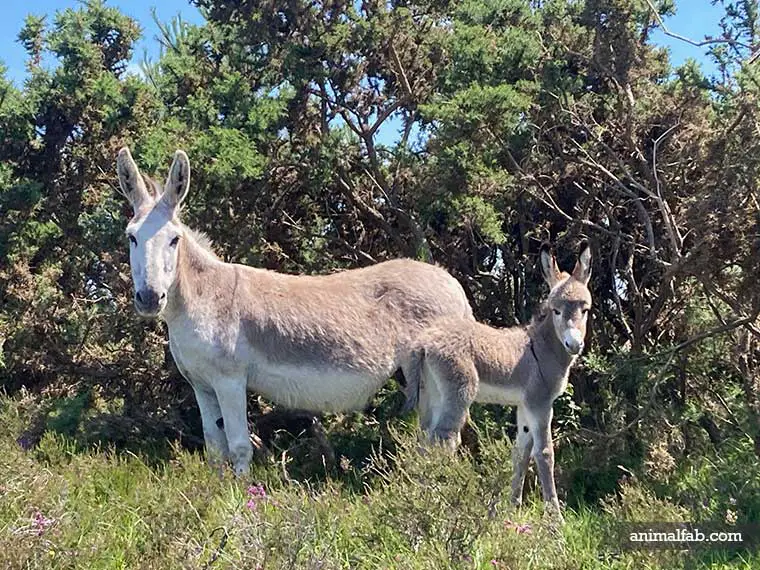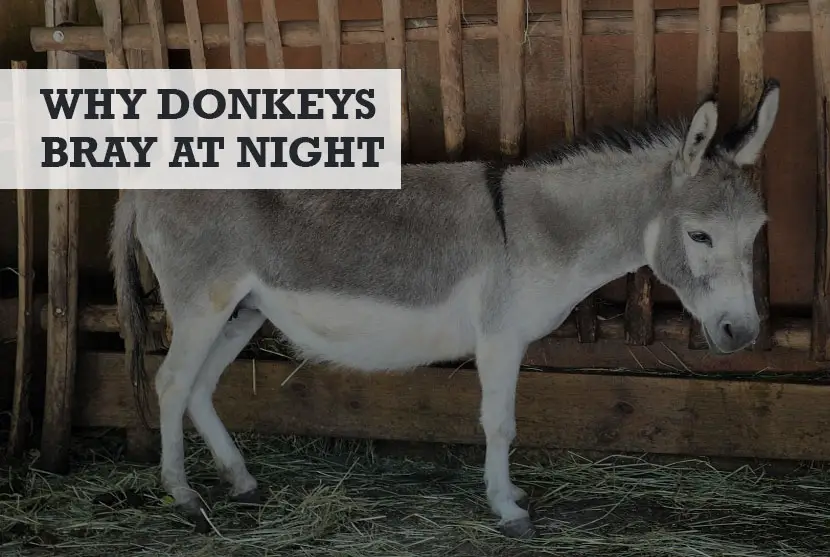Often donkeys can be very hard to read. They tend to look sad a lot of the time, and then hee-haw and bray for no apparent reasons, and even at night. When donkeys cry at night, it can be distressing and worrying.
Being woken up in the dead of night by a donkey braying isn’t the best the most conducive way to get a decent night’s sleep. So, with that in mind, here’s why your donkey brays at night, and how you might be able to stop it.
Why is my donkey braying at night?
It’s important to remember that donkeys bray to communicate. So, any braying, crying, or hee-hawing at night will be related to them trying to tell you, or other donkeys about something. Here are all those possible reasons.
Please be aware though, if you have a donkey who brays all the time, it means something is very wrong, and you should consult with a vet.
1. Braying due to loneliness
Donkeys are very social creatures and like to be in a group. Singular donkeys will bray a lot more than those in a group, so if you have one donkey, once night falls, the braying can start.
One thing that makes donkeys unique is their sense of affection and friendliness. They develop close relationships with their fellow donkeys, dogs, horses, and human beings. Whenever there is no animal or human being insight, a sense of loneliness can engulf them. They deal with this situation by braying to break the silence, perhaps hoping somebody or any of these animals will pop to accompany them.

If you are the owner of a lone donkey and the braying and crying at night is getting too much, I would recommend you buy another to you have a pair.
Donkeys evolved to bray over long distances to communicate with other donkeys, so yours is crying like this to try and make contact… which leads us onto wider communication.
2. Braying to communicate
The question of whether animals communicate with each has been at the core of research for 100s of years. Modern researchers say that animals communicate with each other using non-verbal and verbal cues.
Donkeys are no different, but as far as verbal cues go, all they have is the bray, also known as a hee-haw.
So, if your donkey is braying at night, it means he has something to say to the other donkeys, or even you.
Donkeys can hear up to 60 miles away. So, whilst you might think it’s just your donkey braying, he could be in a conversation with a buddy many miles from your home, and you don’t even realise it.
In a desert environment, a donkey can hear and respond to another donkey’s bray up to 60 miles away.
Horse & Hound Magazine, www.horseandhound.co.uk
3. Braying due to stress or sickness
Just like how human beings are anxious and stressed if there are uncertainties or something is disturbing them, donkeys can equally be distressed if something makes them fearful or stressed.
For instance, some donkeys can bray and cry at the sight or sound of a potential predator (such as a stray dog). If our donkeys sense some danger, they produce the vocalizations either to alert us or scare away their predators. It could also be that something is making it physically uncomfortable, such as insects lodged in its fur.
I would go so far as to compare a braying donkey to how you might hear a neighborhood dog barking at night. Just like the dog, the donkey is crying because something is wrong – similarly the donkey might also show his teeth.
Don’t blame the donkey for crying but try to remove the thing causing the stress.
4. Braying to show love
Donkeys will bray to show affection and love to their fellow donkeys or to us. It could be after we have treated them well, spent time with them, or just excited after seeing us.
Donkeys are affectionate animals, and they like it when other animals or human beings stand by them. They can form strong bonds with other animals or humans. It’s possible that our donkeys sometimes bray to show affection to their fellow donkeys or us.
Here’s a great example…
5. Braying when guarding chickens
We can perhaps get irritated when our donkeys bray persistently at night, but they could be warning you against impending danger to your chickens.
Yes, you heard that right.
Donkeys are known to protect chickens and are sometimes used by farmers to act as an early warning system against predators.
So, whilst you might not have any chickens where you live, the donkey could still be braying at night for the same reason – to warn about something using their guarding instincts.
Donkeys are intelligent animals and can bray to sound alarm bells of imminent danger. Although it may not be easy to discern what our donkeys are warning us against, we have to think of all possibilities around us.
6. Braying due to hunger
Donkeys feed throughout the day or at regular hours, depending on our feeding methods. As a basic rule, we should feed it with little feeds but several times a day. Any change needs to be gradual over a fortnight instead of being radical.
If by any chance we have changed this or have not had an opportunity to feed them at the usual time we are used to, sooner or later, they will start to bray because of pangs of hunger.
When donkeys are hungry, they will most likely bray to prompt us to feed them. The chances are that once we feed them, they will be at peace and will stop making noise.
If they persist braying after feeding them, it could indicate that there is another underlying cause that we might need to figure out.
Handy Hint: Check out this list for donkey owners which explains which foods are bad for them and should be avoided.
How to stop donkeys from braying at night
There is no one technique that will help you to stop a donkey braying at night completely. But, if you can understand why the donkey is braying, you’re halfway there and can limit the night-time crying.
Many donkey owners hate the braying because it is a nuisance. When donkeys bray at night, they can disrupt their sleep which does not augur well with many owners.
One way to stop donkeys from braying at night is to train to refrain from braying at night. Some donkeys bray because of loneliness. Comforting them or finding an animal like a horse or fellow donkey to live with them can help.
Donkeys can also bray when they go hungry. Having a proper feeding schedule can reduce braying. If we are to make any adjustment to the feeding program, it must be gradual to make it hard for the donkey to notice the change.
It’s also advisable to keep the health of our donkeys in check as the braying could relate to sickness.
Are donkeys happy when they bray?
Braying can be a sign of happiness and affection, but it’s not always the case as I’ve outlined above. Compared to other animals such as horses, donkeys are hard to read, and we may not expressly tell whether our donkeys are braying out of sheer happiness.
Their body language is less expressive and can sometimes be misconstrued. While braying can denote happiness, it can also mean the donkey is hungry, lonely, or distressed as shown.

However, there are other signs we can check alongside braying to tell whether our donkeys are braying out of happiness. For instance, unhappy donkeys can be destructive, aggressive, and resistant to your orders.
If the donkeys are braying while displaying these behaviors, they are not happy, and there are probably other underlying reasons. The better we understand our donkeys, the easier it will be for us to discern their sounds.
If in doubt, it’s advisable to seek professional advice to help us decipher the bray.
How do you know if a donkey is stressed?
Although donkeys tend to be subtle compared to horses, some signs should alert the owner that the donkey is stressed. Braying is one of the signs that show that a donkey could be suffering from stress. Bodily injuries, hunger, or harsh living conditions are some things that can make the donkey stressed and make it bray.
Braying alone may not be an accurate measure of whether a donkey is stressed or not. We should check to see if other signs are being exhibited.
Donkeys can exhibit other symptoms such as depression and loss of appetite. We learn our donkeys with time and can tell when they are not in the mood to do anything.
A sudden change of behavior such as loss of appetite could mean that the donkey is stressed. It’s advisable to call a veterinarian to assess if it is sick.
Conclusion
To conclude, your donkey is braying at night to communicate something to you or another donkey. If you can observe their behavior and rule things out, you might be able to better understand why they cry at night with those loud hee-haws.
You might also like…
- The top running speed of a donkey has been recorded
- The truth about donkeys breeding with horses
- How to introduce a donkey into a field of horses
Image in header via https://pixabay.com/photos/donkey-animal-farm-mammal-domestic-316467/

